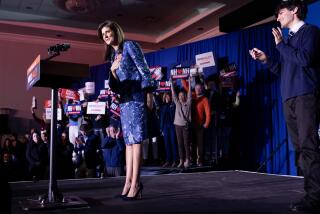Ideas Abound on How to Bolster Bush in N.H. : Campaign: Loyalists suggest ways to counter Buchanan and the recession. They seek to save the President from possible embarrassment.
- Share via
LACONIAH. — President Bush’s loyalists in New Hampshire have no shortage of suggestions for saving his political career from embarrassment when voters go to the polls Feb. 18. But confidence that he will be able to follow them is in short supply.
To beat back conservative commentator Patrick J. Buchanan’s challenge, they say, President Bush will have to mend his ways.
“There’s a feeling that there’s a lack of leadership,” said Robert Yule, a vice president of Energy North, a gas company. It seems that Bush “doesn’t know that in the retail malls, store after store after store (is) empty.”
“There’s a joy at seeing Pat Buchanan up here,” said Yule, who is at the moment supporting the President. “We need to get President Bush moving in the right direction, and use Pat as the catalyst to do that.”
New Hampshire Republicans say the President must:
--Overcome the impression that he is out of touch with everyday concerns, and convince the voters that he “can relate to the working men and women of America.”
--Present definitively “what his agenda is on the domestic policy side,” in the words of his state campaign chairman, Republican Gov. Judd Gregg.
--Repeatedly remind the voters that a “protest” vote for Buchanan will only weaken the incumbent Republican President against the Democrats in November.
--Convince the voters that they need not send Bush a message at the polls about their fears of economic disaster, because he is now hearing them loud and clear.
The President “has his work cut out for him,” said one conservative Republican who is reluctantly supporting Bush.
To be sure, New Hampshire’s first-in-the-nation primary is more than five weeks away, and Bush’s first campaign trip here won’t be until next week. And there is little suggestion that New Hampshire Republicans will, single-handedly, take from Bush the political livelihood they delivered to him four years ago, when he won the state after finishing third in the Iowa caucuses.
But there is every suggestion that voters could severely embarrass him--a risk that is recognized by his most ardent supporters as well as Buchanan’s. Even such partisan figures as the governor are reluctant to predict the outcome.
“We don’t know” how the state of the economy and Buchanan’s “America first” campaign--which takes direct aim at Bush’s focus on foreign affairs--will affect the election results, Gregg said. “There’s a high degree of frustration because of the recession over the past three years. They want to see definitive ideas for how to get out of it.”
The President’s political plight is not enviable, the governor said. “I don’t think he has too many options. There is no magic wand to correct the economy in six weeks.”
New Hampshire is a bellwether for the nation’s economic woes. Since 1988, food stamp recipients have tripled, welfare recipients have risen by 65% and unemployment has climbed to 7.7%. As if that were not enough, the state leads the country in bankruptcy filings. In the year from September, 1990, to September, 1991, filings increased 69%--after a 92% rise the previous year, the American Bankruptcy Institute reported.
State Republicans suggest that Bush take a page from Vice President Dan Quayle’s playbook. On Wednesday and Thursday, Quayle tore into a frenzy of retail politicking, traveling from a shopping center just a few yards from the Massachusetts border to the snow-crusted reaches near Canada 100 miles to the north. At every stop, he engaged in the face-to-face campaigning that voters here take as their due.
“That’s the way it works in New Hampshire,” Gregg said. “People get to talk to and listen to the candidates one on one. You do it on the stump.”
Few know that as well as Bush.
Four years ago, New Hampshire voters breathed life into his campaign when his political future was very much in doubt. He won them over with a revitalized, personable campaign style, mingling with crowds in shopping centers and climbing aboard a snowplow after a blizzard.
As a Republican President seeking a second term, Bush should have been able to look upon the primary season as a victory lap while he prepared for the autumn reelection campaign. But with the economy mired in recession and unemployment in the vicinity of 7%--despite low interest rates and virtually nonexistent inflation--Bush’s popular approval rating has dipped below 50% for the first time. He and his campaigning surrogates, led by the vice president, find themselves on the defensive.
“The recession is not happening at a very convenient time,” one senior Quayle aide lamented.
Meanwhile, Buchanan spent the day hammering Bush on his vulnerabilities. He accused the President of abandoning the state that propelled him toward the Republican nomination in 1988 and repeatedly told New Hampshire residents what they already know: that the state has been in a recession for three years. “What we have now is no ideas and no leadership, and that’s a tough combination to beat,” Buchanan told a radio interviewer in Claremont, N. H.
The durability of Buchanan’s message is uncertain. A poll by the Concord Monitor in late December found Bush drawing 58% of the vote and Buchanan 30%, with 12% undecided. A poll at the same time by the American Research Group gave Bush an almost identical 59% and Buchanan 21%.
Robert A. Mosbacher, who is about to step down as secretary of commerce to become the Bush campaign’s general chairman, declined in an interview to predict the margin by which Bush might win the primary.
“Winning is winning,” he said. “I don’t care if he wins by one-tenth of 1%, or a lot more.”
In New Hampshire, however, it’s not quite that simple.
For example, when Eugene J. McCarthy gained 42% of the vote against Lyndon B. Johnson in 1968, the incumbent President was so politically wounded that he dropped out of the race. But when Gerald R. Ford squeaked past Ronald Reagan in 1976 with 50.1% of the vote, that was considered a Ford victory because Reagan had been expected to gain a clear majority.
To some extent, Bush’s team is taking heart from the fight among the Democrats--Arkansas Gov. Bill Clinton, Sen. Bob Kerrey of Nebraska, Sen. Tom Harkin of Iowa, former Sen. Paul E. Tsongas of Massachusetts and former Gov. Edmund G. (Jerry) Brown Jr. of California.
“They’ll duke it out with each other and take the heat off Bush,” one senior Bush campaign official said, speaking on the condition of anonymity.
But, this official acknowledged, “there is a real concern” over Buchanan, whose message is finding a degree of “receptivity.”
Because of that, Bush’s message carries a subtle warning to Republican loyalists: If they vote for Buchanan to teach the President a lesson, they could “embarrass and wound this President”--and help the Democrats in November.
Times political writer Cathleen Decker contributed to this story.
More to Read
Get the L.A. Times Politics newsletter
Deeply reported insights into legislation, politics and policy from Sacramento, Washington and beyond. In your inbox twice per week.
You may occasionally receive promotional content from the Los Angeles Times.










